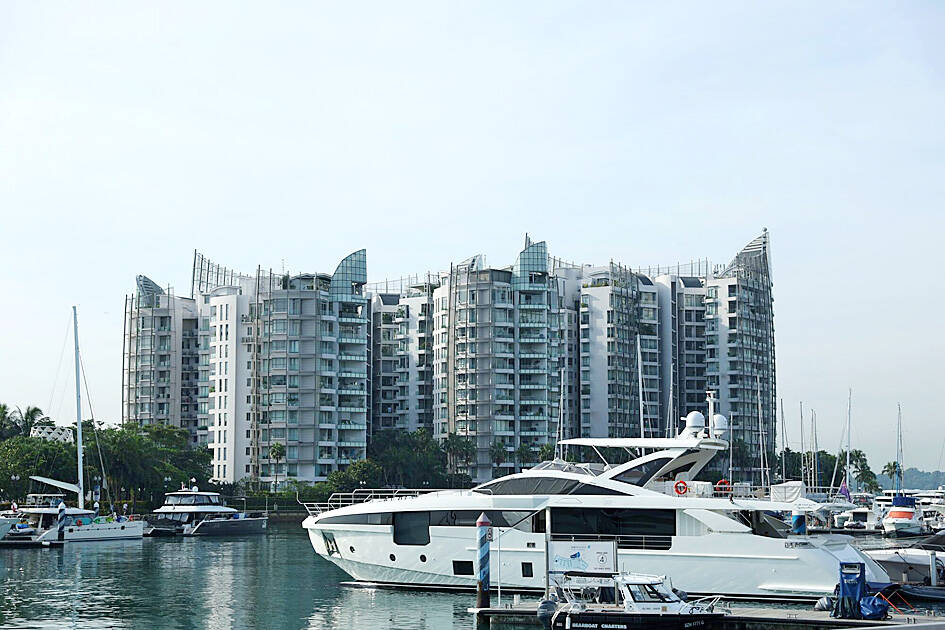The number of luxury condominium units bought by foreigners rose to the highest in almost a decade before Singapore doubled taxes on purchases by the demographic.
Foreigners bought 159 non-landed, luxury homes in Singapore’s core central region in the first quarter, a report by OrangeTee & Tie Pte (橙易產業) showed.
That is up from 71 units a year earlier.

Photo: Bloomberg
The number of luxury condominium units bought by mainland Chinese buyers increased to 111 units, up 158 percent year-on-year, the real-estate company said.
Singapore authorities last month doubled property levies for foreigners to 60 percent, the highest among major global cities, as part of efforts to cool the housing market.
The government has said that the policy is a pre-emptive move as investment demand for residential property is likely to continue to grow otherwise.
“The cooling measures may not affect buyers’ perception of Singapore as one of the best places for property investment,” OrangeTee senior vice president Christine Sun (孫燕清) said, citing economic fundamentals. “Some high-net-worth individuals may continue to park their wealth here as luxury properties are pricey in many other cities.”
Singapore’s home sales surged 80 percent last month from a month earlier to a seven-month high as more projects were launched, government figures released yesterday showed.
Purchases of new private apartments rose to 887 units, Urban Redevelopment Authority data showed.
Foreigners bought 70 units last month, the most since May last year, Huttons Asia Pte Ltd (合登亞洲) senior director of research Lee Sze Teck (李思德) said.
Most purchases were in the S$2 million (US$1.5 million) to S$5 million category, he said.
Geopolitical tensions might have led more foreigners to buy Singapore properties as a safe-haven asset, he added.
While there could be a knee-jerk reaction to government curbs, the measures should have little effect on purchases between S$1.8 million and S$4 million, said Tan Tee Khoon (陳智群), Singapore country manager at PropertyGuru.
“Demand remains from the upgraders as households have a stronger liquidity position due to intergenerational wealth transfers,” Tan said.
The risk of further curbs down the road might prompt some property seekers to bring forward their purchases, he added.

MAJOR BENEFICIARY: The company benefits from TSMC’s advanced packaging scarcity, given robust demand for Nvidia AI chips, analysts said ASE Technology Holding Co (ASE, 日月光投控), the world’s biggest chip packaging and testing service provider, yesterday said it is raising its equipment capital expenditure budget by 10 percent this year to expand leading-edge and advanced packing and testing capacity amid strong artificial intelligence (AI) and high-performance computing chip demand. This is on top of the 40 to 50 percent annual increase in its capital spending budget to more than the US$1.7 billion to announced in February. About half of the equipment capital expenditure would be spent on leading-edge and advanced packaging and testing technology, the company said. ASE is considered by analysts

TRANSFORMATION: Taiwan is now home to the largest Google hardware research and development center outside of the US, thanks to the nation’s economic policies President Tsai Ing-wen (蔡英文) yesterday attended an event marking the opening of Google’s second hardware research and development (R&D) office in Taiwan, which was held at New Taipei City’s Banciao District (板橋). This signals Taiwan’s transformation into the world’s largest Google hardware research and development center outside of the US, validating the nation’s economic policy in the past eight years, she said. The “five plus two” innovative industries policy, “six core strategic industries” initiative and infrastructure projects have grown the national industry and established resilient supply chains that withstood the COVID-19 pandemic, Tsai said. Taiwan has improved investment conditions of the domestic economy

Huawei Technologies Co’s (華為) latest smartphones carry a version of the advanced made-in-China processor it revealed last year, results from an independent analysis showed. This underscored the Chinese company’s ability to sustain production of the controversial chip. The Pura 70 series unveiled last week sports the Kirin 9010 processor, research firm TechInsights found during a teardown of the device. This is a newer version of the Kirin 9000s, made by Semiconductor Manufacturing International Corp (SMIC, 中芯) for the Mate 60 Pro, which had alarmed officials in Washington who thought a 7-nanometer chip was beyond China’s capabilities. Huawei has enjoyed a resurgence since

purpose: Tesla’s CEO sought to meet senior Chinese officials to discuss the rollout of its ‘full self-driving’ software in China and approval to transfer data they had collected Tesla Inc CEO Elon Musk arrived in Beijing yesterday on an unannounced visit, where he is expected to meet senior officials to discuss the rollout of "full self-driving" (FSD) software and permission to transfer data overseas, according to a person with knowledge of the matter. Chinese state media reported that he met Premier Li Qiang (李強) in Beijing, during which Li told Musk that Tesla's development in China could be regarded as a successful example of US-China economic and trade cooperation. Musk confirmed his meeting with the premier yesterday with a post on social media platform X. "Honored to meet with Premier Li